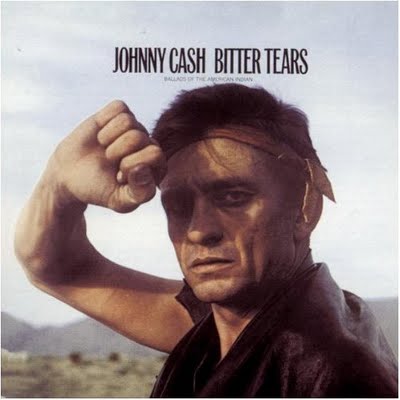Bitter Tears: Ballads of the American Indian
Released in 1964, Johnny Cash’s concept album Bitter Tears: Ballads of the American Indian generated controversy out of the box, with one disc jockey even suggesting it was un-American, and many stations refusing to play it. Mouting his own offensive in defense of the album, Cash had the last laugh: “The Ballad of Ira Hayes,” about the forgotten World War II hero, Pima Indian Ira Hayes, peaked at #3 on the country charts, and the album did even better, topping out at #2. In the videos below, Cash performs all the songs from Bitter Tears.
Johnny Cash, in the ‘Ride This Train’ segment from his February 4, 1970, TV show, honors the Cherokee Nation in narrative and song. From Season 1, Episode 18, the Man in Black performs ‘The Talking Leaves’ and Peter La Farge’s ‘As Long As The Grass Shall Grow’ from Cash’s Bitter Tears album, and ‘Trail of Tears.’ In 1970 Cash recorded a one-sided LP, Trail of Tears told by Johnny Cash, for the Nashville-based Historic Landmarks Association for use in schools and libraries. It was never made commercially available. On the album Cash narrates Private John G. Burnett’s 1890 eyewitness account of the Trail of Tears, the forced removal of the Cherokees from the tribe’s Smokey Mountain home and their tragic journey west in 1838-39.
Johnny Cash, ‘Apache Tears,’ live in Horsens, Denmark, November 7, 1988, from Bitter Tears
Johnny Cash and Buffy Sainte-Marie perform ‘Custer,’ from Cash’s Bitter Tears album, on Season 1, Episode 4 of The Johnny Cash Show, July 5, 1969
Johnny Cash, ‘The Talking Leaves,’ from the Bitter Tears album. Video posted on YouTube by cowboywolfie (http://www.youtube.com/user/cowboywolfie) and well done at that.
Johnny Cash, ‘The Ballad of Ira Hayes,’ live, by Pete La Farge, from the Bitter Tears album
Johnny Cash, ‘Drums,’ from the Bitter Tears album
Johnny Cash, ‘White Girl,’ from the Bitter Tears album
Johnny Cash, ‘Vanishing Race,’ co-written by Cash and Johnny Horton, from the Bitter Tears album
Pima Indian Ira Hayes helped raise the flag at Iwo Jima as depicted in a famous staged photograph by Joe Rosenthal. In the above oil print, titled “The Real Ira Hayes,” former Marine Urshel Taylor (http://www.artnatam.com/utaylor/), a Pima Indian himself, offered a variation on the Rosenthal image. ‘I always try to capture the dignity and majesty of what my people have been and what they continue to be,’ Taylor says.
THE BLUEGRASS SPECIAL
Founder/Publisher/Editor: David McGee
Contributing Editors: Billy Altman, Laura Fissinger, Christopher Hill, Derk Richardson
Logo Design: John Mendelsohn (www.johnmendelsohn.com)
Website Design: Kieran McGee (www.kieranmcgee.com)
Staff Photographers: Audrey Harrod (Louisville, KY; www.flickr.com/audreyharrod), Alicia Zappier (New York)
E-mail: thebluegrassspecial@gmail.com
Mailing Address: David McGee, 201 W. 85 St.—5B, New York, NY 10024
Founder/Publisher/Editor: David McGee
Contributing Editors: Billy Altman, Laura Fissinger, Christopher Hill, Derk Richardson
Logo Design: John Mendelsohn (www.johnmendelsohn.com)
Website Design: Kieran McGee (www.kieranmcgee.com)
Staff Photographers: Audrey Harrod (Louisville, KY; www.flickr.com/audreyharrod), Alicia Zappier (New York)
E-mail: thebluegrassspecial@gmail.com
Mailing Address: David McGee, 201 W. 85 St.—5B, New York, NY 10024



